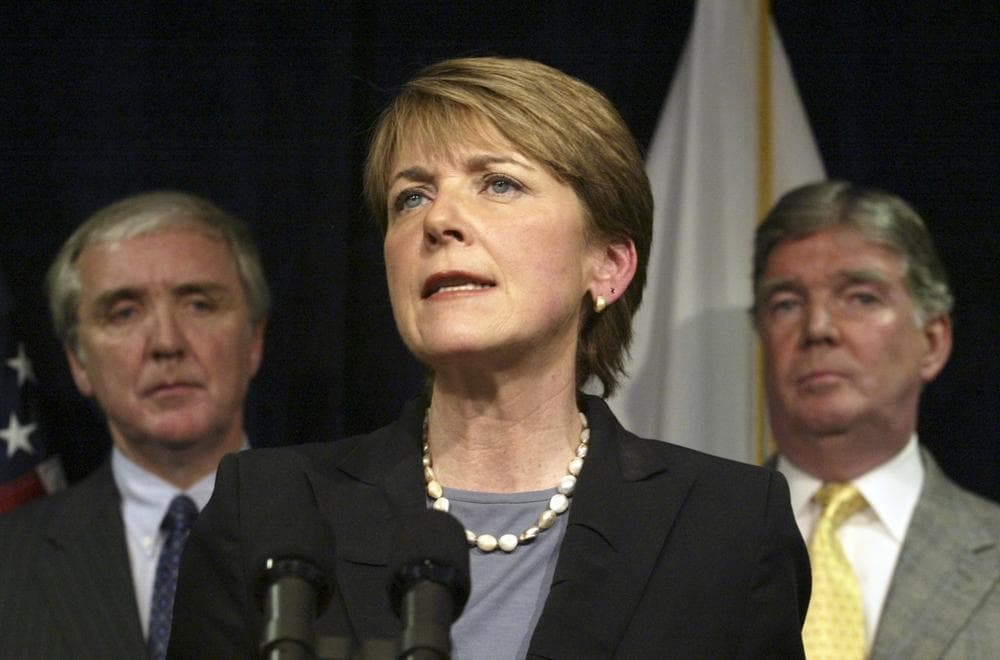Advertisement
The Jury's Still Out On Coakley's Big Dig Settlement Deal

As attorney general, Martha Coakley has made many decisions that affect citizens in the commonwealth. But the one with the most breadth of coverage and potential impact is one you don’t hear her talk about on the campaign trail: choosing to settle the criminal case against the contractors of the big dig for $458 million, instead of going to trial.
Some call it courageous, others call it a cop out.
When Coakley announced the deal with Bechtel/Parsons Brinkerhoff in January 2008, she called it “a good settlement,” but not a perfect one. It was better than going to court, Coakley said at the time.
"The amount of money that has been paid and will be paid over the next several days and months as a means of punishment and restitution to the commonwealth for the flaws in the system far outweigh what we could have accomplished certainly in a criminal indictment," Coakley said, "and perhaps even in a complicated and endless appeals in a civil matter."
"She could have left it in the hands of a jury and not been held responsible for the consequences."
--Brad Henry, del Valle family lawyerCoakley stands by her reasoning today. She was elected attorney general in November 2006, five months after a ceiling panel in the Interstate 90 connector tunnel fell and killed Milena del Valle.
When Coakley assumed the office from Tom Reilly, she took over the investigation. Reilly said she made her decision to settle not based on emotion or politics, but by looking at the facts.
"I think she did an outstanding job with the settlement," Reilly said. "She kept her options open, she brought people to the table and then made a decision, and I think the results speak for itself."
The result was the largest settlement for a transportation case in the state’s history. But some say Coakley sold out, including Mary Connaughton, who has served on the Turnpike Authority board for the past four years. "Anytime there’s a settlement, the public loses the insight into what actually happened," she said.
Advertisement
Connaughton said that by choosing to settle the case rather than bring it to trial, the public lost transparency. "We’ll never know now," she said. "There’s so much that might have happened that we could have learned from. You know, the public likes accountability and they don’t know."
"How do you measure $450 million?" Connaughton asked. "Is that worth it? Is that going to make the public feel any better about what happened with the whole Big Dig process? I don’t know."
"How do you measure $450 million? ... Is that going to make the public feel any better about what happened?
--Mary Connaughton, former Turnpike board member There’s no question a court case would have dragged on for years with appeals and huge legal fees. Many give Coakley high marks for making a decision in the case, realizing she would be second guessed and criticized. But some question whether it was politically motivated — Coakley was exploring a run for the Senate as early as 2004.
Lawyers who were kept informed about the negotiations said Coakley was dealing with a company that had previously refused to admit poor oversight of the project. Jeffrey Denner represented the husband of the woman killed in a lawsuit against Bechtel and said "it was a tough situation."
"She was faced with a real-life situation of major corporations with cadres of lawyers that would have probably strung this out for year and years with no certainty of ultimate victory," Denner said.
During settlement negotiations, Denner said he was impressed with Coakley’s compassion for the relatives of del Valle. She called them multiple times to make sure they would be satisfied if the state took a deal instead of went to court.
Lawyer Brad Henry represented del Valle’s three children who live in Costa Rica. He said Coakley made a "courageous decision" because many prosecutors could have and would have simply left it to a jury. "Instead she brought it to the head, brought it to a close and recovered a vast amount of money for the taxpayers," Henry said. "She could have left it in the hands of a jury and not been held responsible for the consequences."
Bechtel’s $458 million payout was three times the company’s profit on the contract. If there is a future catastrophic problem, Bechtel has pay up to $100 million extra. One of the legacies of this project is dozens of leaks in the harbor tunnels Bechtel built. That’s one reason the yearly maintenance cost is $100 million.
Added to these costs, Mary Connaugton said it bothers her and others that the settlement protects Bechtel from being suspended or disbarred so it can bid on and profit from other projects in the state. "I think a lot of people in the public would like to see more retribution for what happened in terms of this whole debacle in terms of oversight management of the Big Dig," Connaughton said.
The real analysis of whether or not Martha Coakley’s decision to settle the case against Bechtel/Parsons Brinkerhoff was a good deal will come years later. That’s when the public will see how well the tunnel holds up and what the state is paying to fix problems and maintain the roadway that changed the face of Boston.
This program aired on November 12, 2009.